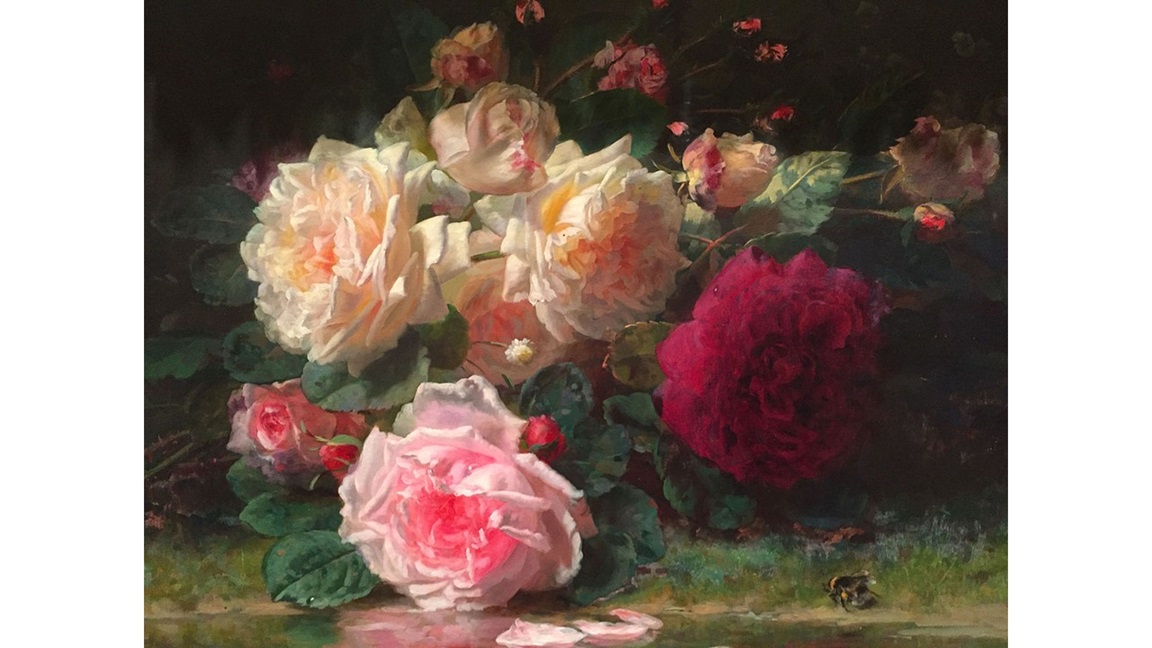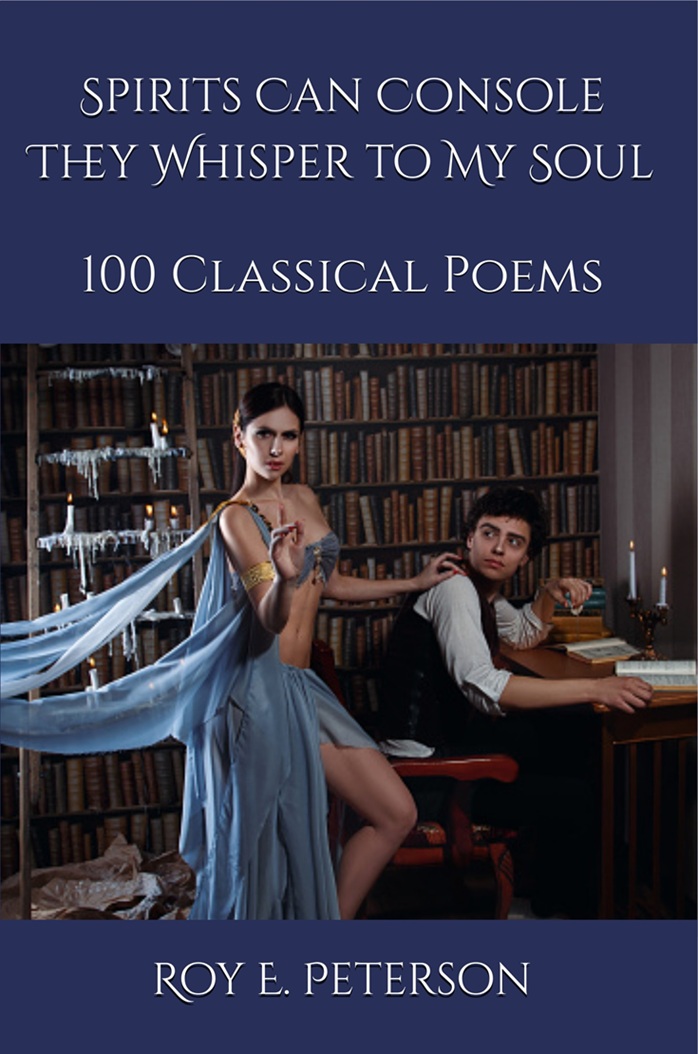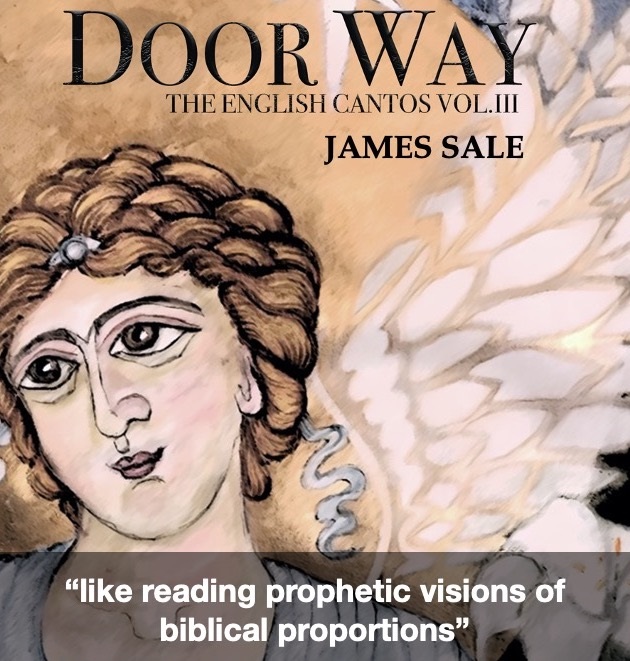.
Mid-September Reverie
from the book Eternal Spring
Moonbeams at midnight and frost on the pole;
Wind in the willows to tickle the soul;
Roses in gardens still share their perfume;
Peonies offer the last of their bloom.
Squirrels grab the acorns to store in their nests.
Baking a pie and inviting some guests.
Coffee and cream on the terrace at noon.
Relish fresh air because winter comes soon.
Corn from the field and dried oats in the bin;
Squash on the step to be joined by pumpkin.
Birds flying off as the temperature drops.
Ants hurry home as their work never stops.
Owls in the trees asking each other, “Who?”
A cat wanders by, but still wary of you.
Out on the porch we can sit and can rock
Our chairs in the evening and not watch the clock.
Leaves on the trees turning golden and red;
A bear finds a cave for his sleepy old head.
The world’s shutting down and enclosing its space.
This night will be warm by the big fireplace.
.
.
LTC Roy E. Peterson is a writer, retired U.S. Army Military Intelligence Officer, Foreign Area Officer, and Foreign Commercial Officer who currently resides in Texas.

















One of the most visual poems I’ve ever come across, it reads with the nostalgia-like feel of ‘The Night Before Christmas’.
Thanks for the read, Roy.
I could not have asked for a better comment! What a wonderful comparison with “The Night Before Christmas”!
This is such a picturesque poem that describes Autumn just around the corner, as the temperatures begins to cool and we ready ourselves for winter.
Thank you for a lovely read Roy.
Thank you, Norma, for your precious comments!
This is a very charming poem, Roy, with many beautiful and nostalgic images. I found myself smiling with recognition again and again.
Brian, I deeply appreciate your thoughts and am smiling at your smiling.
A perfect poem for the cusp of autumn.
This poem calls to mind so many simple joys and observations we used to take for granted, but have been replaced by electronic skills.. Try telling a contemporary kid to listen to an owl, or imagine a bear looking for a place gto hibernate ~ imagine yourself rocking in the cool evening air !
Simple joys that go to make character. Thank you, sir. ===
Sally, you make a great observation comparing the simpler enjoyments of life to the modern electronic one. I am with you on what we are missing.
Simple joys that go to make character, now replaced by electronic nonsense. Thank you sir, for reminding us that they are still there…
Indeed, they are still there if we chose to find them!
Excellent!!
Thank you, Pat.
Wow, great one, Roy! The simple joys of rural life, the autumn sights… You’ve captured so well the kind of life I want to live. Well done!
Deeply appreciated, Joshua! In essence, I returned to my distant past in my mind when writing this one. I was eleven years old before we got electricity at our farmhouse.
I enjoyed your poem too and agree with
all of the above comments.
Thank you, jd.
great poem
Wonderful comment, Benjamin!
Really like this, Roy, especially the wary cat!!! Marvellous – well done.
James, I deeply appreciate your comments, especially since I am always amazed by your great talent in writing poetry.
You paint so many September scenes to linger in this poem. I also particularly enjoyed the image of a wary cat.
I particularly loved the word “paint” in your comments and liking “the wary cat.”
Pleasant September collage in waves of gentle rhythm. Since I see by the last line that you pronounce “fire” with two syllables, I wonder about “squirrels.” They are two syllables to me, and therefore I would scratch out “the” before “acorns.” Were the farmhouse lamps kerosene or oil, or did you have candles?
Margaret, interesting comment on the syllabic count with “the,” which came before acorns. I played with that small phrase a couple of times. Indeed, I will scratch that out for my next book of poems underway. I grew up on a farm in South Dakota before we moved to Texas. We did not have electricity until I was eleven years old. Our furnace was oil replacing coal, but our lamps were kerosene. Our kitchen stove burned cobs and wood! My accent is midwestern, so I pronounce more syllables like “fire” for two and every for three, although I have considered fire to be a “switch hitter” of either one or two. If I need to add or deleted a syllable with “every” I always use and apostrophe to cut out the middle “e” as in “ev’ry”.
This is a great, uplifting poem Roy. I could almost hear Julie Andrews warbling away to it.
Thanks for a super, seasonal read.
Interesting thought about Julie Andrews. Thank you so much, Jeff, for taking my mind to the “Sound of Music.”
Simply beautiful – an autumn gem of a poem!
Thank you, Susan! I always appreciate your comments!
Margaret, interesting comment on the syllabic count with “the,” which came before acorns. I played with that small phrase a couple of times. Indeed, I will scratch that out for my next book of poems underway. I grew up on a farm in South Dakota before we moved to Texas. We did not have electricity until I was eleven years old. Our furnace was oil replacing coal, but our lamps were kerosene. Our kitchen stove burned cobs and wood! My accent is midwestern, so I pronounce more syllables like “fire” for two and every for three, although I have considered fire to be a “switch hitter” of either one or two. If I need to add or deleted a syllable with “every” I always use and apostrophe to cut out the middle “e” as in “ev’ry”.
Vivid imagery combined with a rolling, sing-song rhythm. Enjoyed reading this!
Thank you, Sourav!